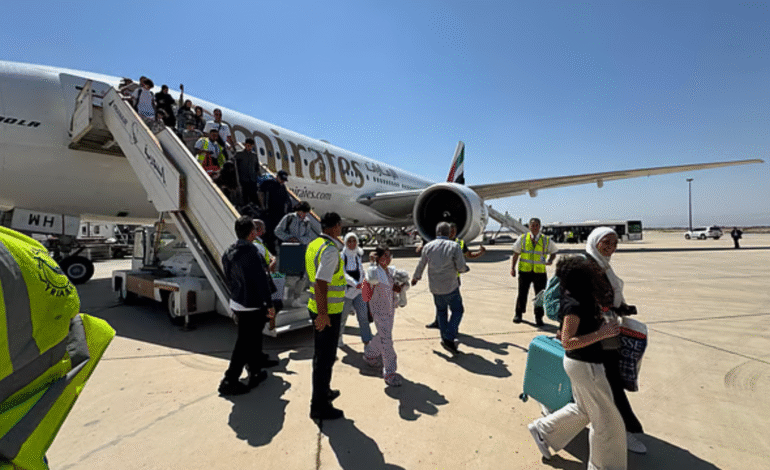In a significant step toward reconnecting a war-torn nation with the global community, major Gulf carriers such as Emirates, flydubai, Air Arabia, Qatar Airways, and flynas are resuming flights to Syria in 2025. After years of suspension due to conflict and sanctions, this cautious yet determined move signals hope for Syria’s recovery and aims to reconnect the Syrian diaspora with their homeland. Despite challenges like regional tensions and infrastructure limitations, these airlines are paving the way for enhanced trade, tourism, and family reunions. This article explores the details of this aviation milestone, its implications for Syria’s economy, and the hurdles that remain.
Gulf Carriers Leading the Way
The resumption of flights to Syria by Gulf airlines marks a turning point for the nation’s aviation sector. After a hiatus of over a decade due to the Syrian civil war, airlines are responding to easing sanctions and a shifting political landscape. Below are the key developments:
Emirates Resumes Damascus Flights
Emirates, the UAE’s flagship carrier, relaunched flights to Damascus International Airport on July 16, 2025, with flight EK913, a Boeing 777-200LR, departing Dubai at 12:09 PM and arriving in Damascus at 2:10 PM local time. Operating with a 302-seater aircraft, Emirates aims to reconnect the Syrian diaspora to their homeland while supporting UAE-Syria bilateral ties.
In a statement, Emirates highlighted, “These flights will open new opportunities for travelers to connect to our network of nearly 150 destinations, supporting Syria’s aspirations to rebuild key sectors like energy, construction, and agriculture.” The airline’s codeshare partner, flydubai, resumed flights to Damascus on June 1, 2025, offering seamless connectivity through Dubai’s aviation hub.
Air Arabia’s Double Daily Flights
Air Arabia, based in Sharjah, resumed flights to Damascus on July 10, 2025, with double daily non-stop flights from Sharjah International Airport. This schedule provides travelers with greater flexibility, catering to both business and personal travel needs. Air Arabia’s low-cost model makes travel accessible, fostering stronger ties between the UAE and Syria.
Qatar Airways Targets Aleppo
Qatar Airways announced the resumption of flights to Aleppo, starting August 10, 2025, with three weekly flights. From September 1, 2025, the frequency will increase to four weekly flights, enhancing connectivity to Syria’s second-largest city. This move underscores Qatar’s commitment to supporting Syria’s recovery and facilitating travel for the Syrian diaspora.
Other Gulf Carriers Join In
Saudi Arabia’s flynas is also planning to resume flights, joining the wave of Gulf carriers re-entering the Syrian market. According to industry reports, at least 11 foreign airlines are scheduled to operate in Syria in July 2025, a significant increase from just three the previous year. This surge reflects growing confidence in Syria’s potential for stabilization and economic revival.
Why Gulf Airlines Are Returning
The decision to resume flights is driven by several factors, as outlined by Saj Ahmad, Chief Analyst at Strategic Aero Research:
- Easing of Sanctions: The lifting of international sanctions has opened pathways for airlines to access aircraft parts, maintenance services, and commercial transactions, as noted by the International Air Transport Association (IATA).
- Demand from Syrian Diaspora: The GCC region hosts a large Syrian diaspora, creating a strong demand for direct flights to reconnect families.
- Market Competition: Airlines are keen to secure a foothold in Syria’s emerging market, avoiding the risk of losing out to competitors.
- Support for Recovery: Flights facilitate trade, tourism, and foreign investment, critical for rebuilding Syria’s energy, construction, and agriculture sectors.
Ahmad noted, “Gulf carriers are happy to accommodate disruptions because their operations in Syria are limited, minimizing the impact of regional instability.”
Challenges Facing Syria’s Aviation Sector
Despite the optimism, resuming flights to Syria is not without hurdles. The country’s aviation infrastructure and regional tensions pose significant challenges:
- Dilapidated Infrastructure
Syria’s airports, particularly Damascus International Airport and Aleppo International Airport, suffer from years of neglect. Alaa Sallal, director of public relations at Syria’s Civil Aviation Authority, reported, “The airport’s construction was dilapidated, equipment was worn out, and some was missing.” The absence of modern radar systems forces reliance on Lebanese or Turkish radar for air traffic control, complicating operations.
The Syrian General Authority for Civil Aviation plans to build new airports in Damascus, Aleppo, and the central region, but funding and time constraints in a war-ravaged economy present significant barriers.
- Regional Tensions
Ongoing regional conflicts, including intermittent Israeli airstrikes, continue to disrupt air travel. On July 16, 2025, Israel struck the Syrian military headquarters in Umayyad Square, Damascus, following sectarian clashes in Sweida. Such incidents have led to temporary airspace closures across the Middle East, forcing airlines like Royal Jordanian, flydubai, and Qatar Airways to cancel flights in recent months.
- Operational Risks
Airlines face risks from unstable airspace and potential disruptions due to conflicts involving Israel, the US, and Iran. These factors deter some carriers from committing to larger operations in Syria, limiting the scale of flight resumptions.
Despite these challenges, Gulf carriers remain committed, viewing their role as vital to Syria’s long-term recovery.
Implications for Syria’s Recovery
The resumption of flights by Gulf airlines is a critical step toward rebuilding Syria’s economy and global connectivity. Key implications include:
- Reconnecting the Syrian Diaspora
With millions of Syrians living in the GCC and beyond, direct flights enable family reunions, fostering emotional and cultural ties. This connectivity is essential for maintaining Syrian heritage and supporting communities abroad.
- Boosting Trade and Investment
Increased air links facilitate business travel, encouraging foreign investment in sectors like energy, construction, and agriculture. Emirates noted that its flights will support the UAE’s efforts to strengthen bilateral ties with Syria, opening new avenues for economic collaboration.
- Reviving Tourism
Syria’s rich cultural heritage, including historical sites in Damascus and Aleppo, could attract tourists as stability improves. Air Arabia’s double daily flights and Qatar Airways’ Aleppo routes make these destinations more accessible.
- Supporting Long-Term Stability
Enhanced connectivity signals a return to normalcy, boosting confidence among Syrians and the international community. It also aligns with the UAE’s broader vision of fostering regional stability and economic growth.
What This Means for Travelers
For travelers, the resumption of flights offers:
- Convenient Connectivity: Access to Emirates’ network of 150 destinations via Dubai, Air Arabia’s affordable flights from Sharjah, and Qatar Airways’ routes to Aleppo.
- Flexible Options: Double daily flights by Air Arabia and weekly schedules by other carriers cater to varied travel needs.
- Affordable Travel: Low-cost carriers like flydubai and Air Arabia make trips to Syria accessible for families and businesses.
However, travelers should stay informed about regional developments and check airline advisories due to potential disruptions from airspace closures or security issues.
Challenges Ahead
While the return of Gulf carriers is promising, Syria’s aviation sector needs significant investment to overcome:
- Infrastructure Upgrades: Modernizing airports and acquiring radar systems are critical for safe operations.
- Regional Stability: Resolving conflicts and ensuring safe airspace will encourage more airlines to operate.
- Funding Constraints: Rebuilding airports requires substantial financial resources, which may require international support.
The Syrian Civil Aviation Authority is working to address these issues, but progress will take time.









1 Comment
[…] Saudi Arabia is soaring to new heights with the launch of a new low-cost airline, a strategic move to position the Kingdom as a regional aviation hub. Based at King Fahd International Airport in Dammam, this initiative is a cornerstone of Saudi Vision 2030, aimed at transforming the nation’s transport and logistics landscape. Spearheaded by a consortium led by UAE-based Air Arabia, alongside Kun Investment Holding and Nesma Holding, this budget airline promises to revolutionize air travel in the Eastern Province and beyond. With a fleet of 45 aircraft, the carrier will connect 24 domestic and 57 international destinations, targeting 10 million passengers annually while creating over 2,400 jobs. This article delves into the details of this transformative project, its alignment with Saudi Arabia’s economic diversification, and its impact on regional connectivity. […]
Comments are closed.